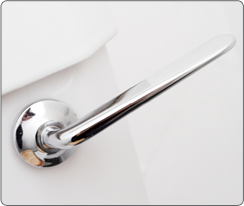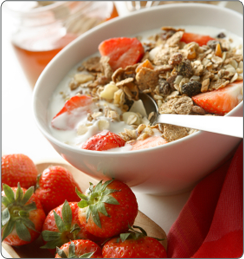Your Colon’s Cue for Help
At one point or another, most people are going to have that unpleasant, often painful experience of occasional constipation. Though it can mean different things to different people, constipation is a world-wide health concern, affecting as many as 12% of the human population.

What is constipation?
Clinically speaking, constipation is defined as “infrequent bowel movements (typically fewer than three times per week), difficulty during defecation (straining during more than 25% of bowel movements or a subjective sensation of hard stools), or the sensation of incomplete bowel evacuation.” Chronic, recurrent, or severe constipation can be serious and warrant a visit to your physician.
Where bouts of occasional constipation are concerned, however, you might just need to take a closer look at a few lifestyle patterns, including:
- the foods you eat
- the liquids you drink, and
- whether or not your daily activities are helping or hindering your body’s ability to eliminate.

For starters, you should look at the amount of dietary fiber you consume on a daily basis. Fiber is an important part of a healthy diet for many reasons, and preventing constipation is certainly one of them. How so? Well, as waste moves through the body, the colon absorbs excess fluid from it. If the colon moves the waste through too slowly, stool may become harder, dryer, and more solid, making it more difficult (and even painful) to pass. Fortunately, fiber provides bulk and a gelatinous texture to stool, which helps your colon keep the waste moving.
Aiming for a good 20-35 grams of fiber per day is an excellent way to make sure that the bowels work efficiently and that waste doesn’t move through the colon too slowly. Unfortunately, the average American diet yields a sad daily dose of only 5-15 grams.That’s quite a bit less than optimal. On the other hand, it’s well-accepted in medical circles that people who eat a high-fiber diet are less likely to develop and experience constipation.
You can get more fiber in your diet simply by adding more fruits, vegetables, whole grains, nuts, seeds, and legumes to your daily meals and snacks. Alternately, use a good, all-natural fiber supplement, which can be easily incorporated into your daily routine.
Water & Constipation
Another cause of constipation may be insufficient intake of pure water. It’s good to remember that not all liquids are equally liquefying. That is, even though you may drink plenty of soda or coffee, they do not have the same effect on your body as pure water. In fact, the caffeine in such common drinks can have a dehydrating effect on the body, making you excrete more water than you take in! To alleviate a bout of constipation, try upping your water intake, aiming for at least a good 6 to 10 eight-ounce glasses. And avoid caffeinated beverages until your bowel habits return to normal.

Finally, consider looking at whether you could increase your physical activity. Believe it or not, lack of physical exercise can be a contributing factor to constipation. Indeed, one source suggests that exercise is essential for bowel regularity. Because exercise accelerates breathing and heart rate and stimulates the natural contractions of the large intestine, daily exercise can help keep you regular. Try adding yoga, stretching, dancing, swimming, or even just walking to your daily routine.
Everyone knows what constipation is, and most of us will experience it at some point or another. If you’re regular most of the time, experiencing constipation only now and then, when it does strike it could be a cue from your colon that it may need a little extra help. Do your bowels a favor by increasing your intake of both dietary fiber and water, and by putting your body into motion. Just these few simple changes may be enough to help transform your occasional uncomfortable bout of constipation into effortless regularity. A colon cleanse product like Colonix or a fiber supplement like Unifiber are products to consider.
1 Garner, A. (2008). Constipation. Encyclopedia of Global Health. Retrieved April 16, 2011, from http://0-www.sage-ereference.com.leopac.ulv.edu/globalhealth/Article_n310.html
2Markland, A. (2007). Gastrointestinal aging. Encyclopedia of Health & Aging. Retrieved April 16, 2011, from http://0-www.sage-ereference.com.leopac.ulv.edu/aging/Article_n115.html
3Constipation. (2007). National Digestive Diseases Information Clearinghouse. Retrieved April 16, 2011 from http://digestive.niddk.nih.gov/ddiseases/pubs/constipation/index.htm
4Mcgee, E. (n.d.). Why you need more fiber. WebMD. Retrieved April 16, 2011 from http://www.webmd.com/diet/features/why-you-need-more-fiber
5The basics of constipation. (2010). WebMD. Retrieved April 16, 2011 from http://www.webmd.com/digestive-disorders/exercise-curing-constipation-via-movement

